Cape Town's Service Dining Rooms celebrate 90 years of feeding the vulnerable
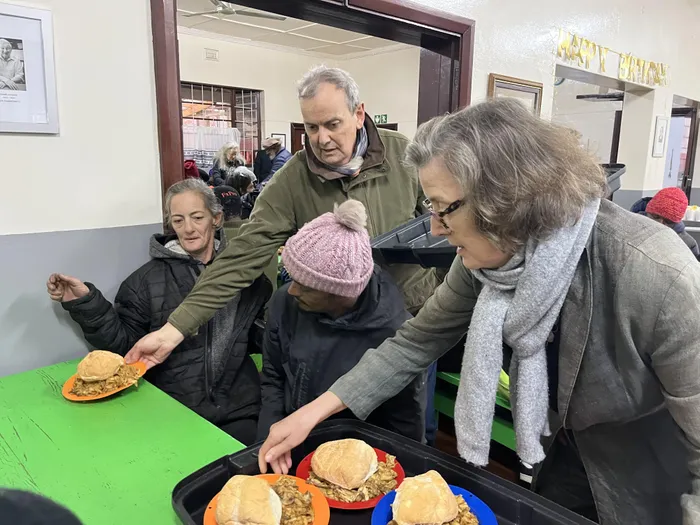
James Browne, from Stellenbosch, and his sister Rachel Browne, from Botrivier, serve Desiree Arendse and her husband Steven, who live in an abandoned building, in Cape Town.
Image: Fouzia Van Der Fort
Cape Town’s historic Service Dining Rooms celebrated 90 years of serving the city’s most vulnerable on Friday 4 July, with descendants of the founder helping dish up meals to those in need.
James Browne, from Stellenbosch, and his sisters Rachel, from Botrivier, and Louisa, from Simon’s Town — the grandnephew and grandnieces of the late Doris May Syfret of Rondebosch — served hot meals to people living on the streets and in shelters.
Guests were given a plate of chicken and mushroom pasta with a roll, followed by custard and peaches, and an apple — all from the historic red-brick kitchen at 82 Canterbury Street.
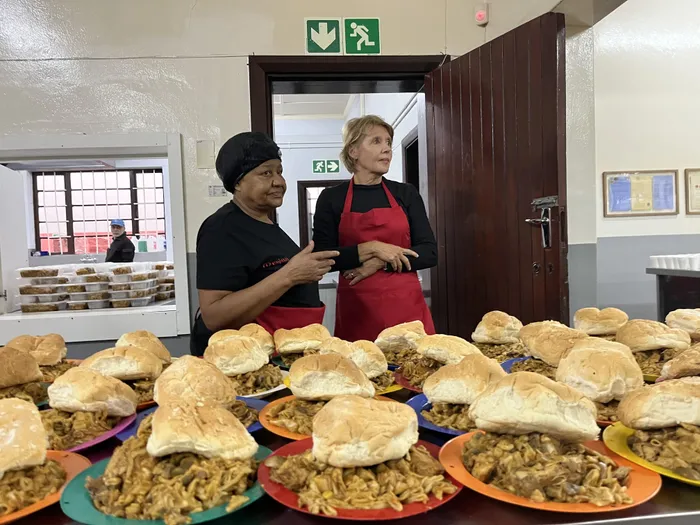
The Service Dining Rooms' cook Regina Philander, from Clarkes Estate Elsies River, and volunteer and board member Mieke van Rensburg, from Oranjezicht.
Image: Fouzia Van Der Fort
Ms Syfret began serving the poor and destitute in 1933 during the Great Depression, which was a global economic crisis spanning from 1929 to 1939
Since 1935, the charitable organisation has operated from the same property in Cape Town, serving millions of meals to the city’s most vulnerable.
Today, clients pay just R2 for a nutritious plate of food, continuing the legacy of the original 'tickey meal' that has sustained the hungry for 90 years.
The Service Dining Rooms now dish up around 250 meals each weekday.
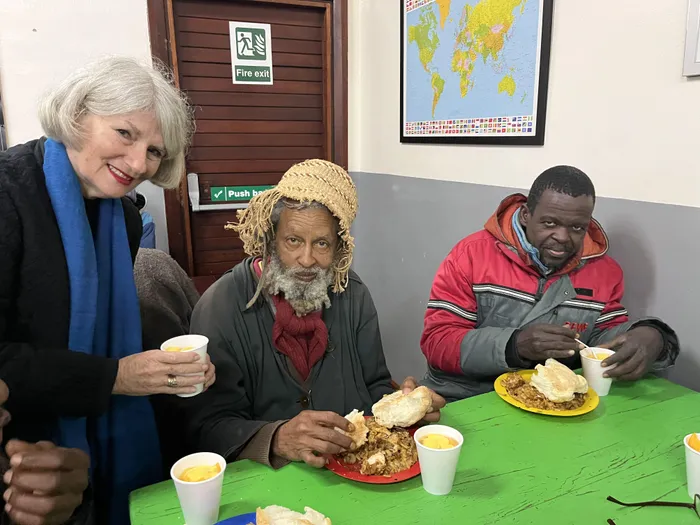
Dr Laurine Platzky, chairwoman of the Service Dining Rooms from Oranjezicht, with Zamile August, 67, who lives in a Lansdowne shelter, and Siphiwe Khoza, 43, who is living on the streets of Cape Town.
Image: Fouzia Van Der Fort
Mr Browne said his aunt had helped people recover from the Great Depression.
Not just feeding them, but also trying to provide them with life skills and a sense of purpose,” he said.
That legacy continues today. Desiree Arendse, who lives in an abandoned building in Cape Town, said being served at the Dining Rooms allowed her to feel “normal”.
Ms Arendse has been coming for nearly 20 years.
She said that since living on the streets, she had always made sure to have the small amount needed — back then, just five cents — to pay for her meal.
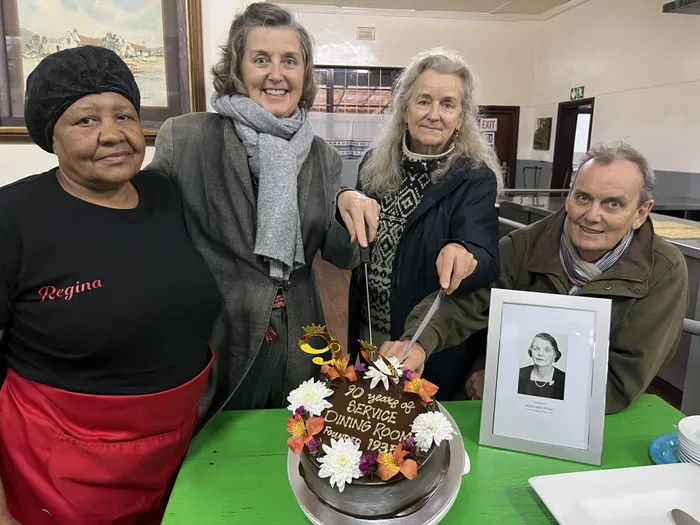
Service Dining Rooms cook Regina Philander, from Clarkes Estate in Elsies River, pictured with Rachel Browne from Botrivier and her sister Louisa Browne from Simon’s Town, along with their brother James Browne from Stellenbosch. They are grandnieces and grandnephew of the Rooms’ co-founder, Doris May Syfret.
Image: Fouzia Van Der Fort
Ms Syfret was a staunch Anglican, a parishioner of St Thomas's Anglican Church in Rondebosch, and a member of the Black Sash — a South African human rights organisation formed in 1955 by a group of white women in opposition to apartheid.
They wore black sashes as a symbol of mourning for the death of constitutional rights. The group continues its work today, advocating for social justice and human rights in South Africa.
Mr Browne’s sister Rachel described their aunt as a passionate woman of service. Their family owned a farm and would often supply fruit to the Dining Rooms.
“We would sit in the car when our mom dropped off goods or stopped in to visit,” she said.
Over the past two decades, Ms Arendse said the price of a meal had steadily increased — from 5 cents to 50 cents, then to R1, and now R2.
"It is the one place I know I can get a plate of food," she said.
She recalled how, over the years, partnerships with other organisations allowed her and others to access showers at a nearby facility. Ms Arendse collects tins and takes them to a scrap yard to cover the cost of her daily meal.
"Well done. Congratulations. Keep up the good work. Please don’t close the doors, because there are a lot of people who depend on this meal," she said.
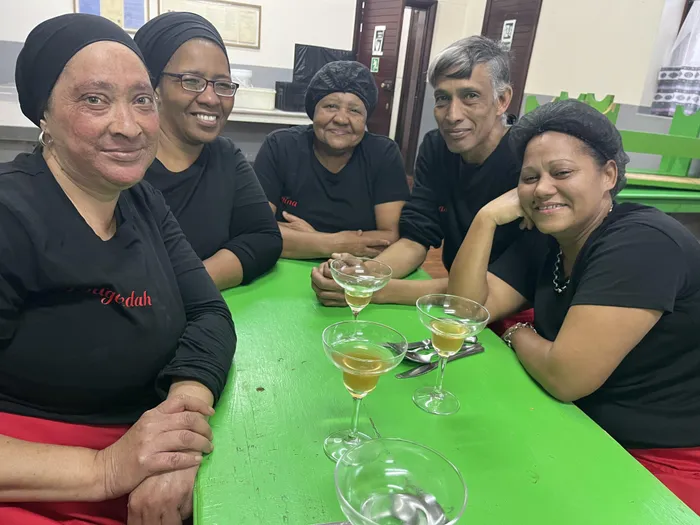
Service Dining Rooms staff Tougeedah Britton, Nozuko Klaas, Regina Philander, Ikraam Baderoen and Nazeera Carolissen.
Image: Fouzia Van Der Fort
Siphiwe Khoza, 43, who lives on the streets of Cape Town, said the small payment required for a meal was a good way to encourage people to take responsibility.
He explained that some people prioritise cigarettes or spend their entire social grant on non-essentials, rather than food.
Zamile August, 67, who was born and raised on the streets of Cape Town, said his name is on the housing waiting list.
He used to have a shack in Philippi, but it burned down while he was working in Kronendal. He now lives in a shelter in Lansdowne and takes the first train into town each morning to get his daily meal.
Mr August said his pension allows him to pay for his meals in advance.
“It’s important to contribute,” he said, adding that the work of the Service Dining Rooms is essential.
Chairwoman of the board, Dr Laurine Platzky, said what began as a response to unemployment during the Great Depression has evolved into an essential daily lifeline for hundreds of people.
“Our commitment remains unchanged, and the need is still very much there,” she said. “The dining rooms offer more than just a meal – they give people a sense of community and support.”
Dr Platzky said the R2 cost was not the price of the meal, but a symbolic contribution. “It is a token – a contribution people make. There is a dignity in that, because you are not just taking charity,” she said.
The organisation has remained open through the Depression, apartheid, the transition to democracy, economic upheavals, and most recently Covid-19 pandemic, never ceasing operations.
A formal celebration will be held on Saturday, October 11, with Mayor Geordin Hill-Lewis expected to attend, along with 50 guests, including long-time clients, supporters, and community partners.
The organisation operates with a small team of six full-time staff and relies heavily on community support, including regular volunteers from the University of Cape Town (UCT), Cape Peninsula University of Technology (CPUT), and local high schools.
Recent contributions have enabled much-needed renovations to modernise the kitchen facilities, dining areas, and client amenities, all while preserving the historic character of the building.
In a fortunate discovery, the Service Dining Rooms also uncovered a collection of historical documents and photographs dating back to the 1950s, offering a valuable record of the organisation’s lasting impact on Cape Town’s social history.
The organisation also welcomes volunteers and in-kind donations of food and supplies, donations of blankets, warm clothes and especially socks.
For more information about the Rooms, anniversary events or supporting their mission, call acting operations manager and board member Janey Ball on 021 465 2390 or email info@sdr.org.za.
Related Topics: